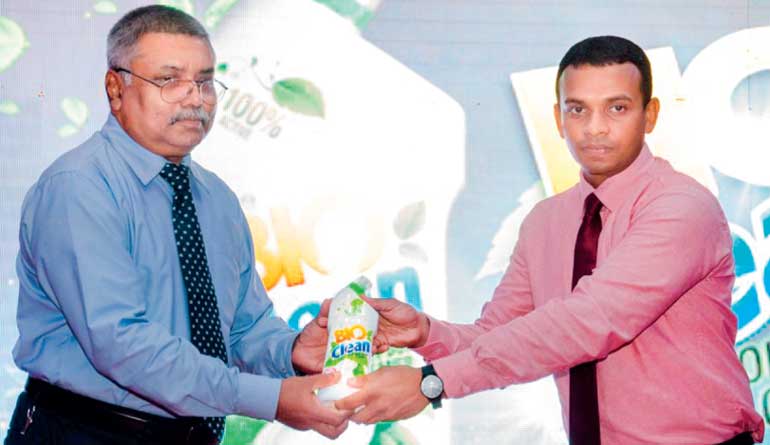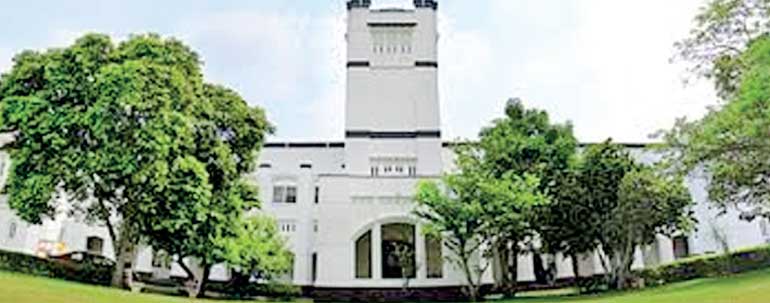Wednesday Feb 18, 2026
Wednesday Feb 18, 2026
Tuesday, 26 July 2016 00:09 - - {{hitsCtrl.values.hits}}
State universities in Sri Lanka often make the news and unfortunately so for demonstrations, boycotting of lecturers and at least twice in the post-Independence period as ‘breeding grounds for insurgents’. Lost in the ‘news’ is the fact that they are institutions of learning, of scholarship and research. Students as well as the faculty do engage in research activities under trying circumstances and often with scarcely any funding.
On the other hand it is very rarely that such exercises inform policy or prompt applications that benefit the country in tangible ways. It is unlikely that there has ever been an instance where a private company actually funded research with the objective of developing a consumable and an environment-friendly one at that! That’s what is unique about Bioclean, the result of a joint effort by Darley Butler & Company Ltd. and the University of Colombo Science and Technology cell (UCSTEC).
It all began with the two parties signing a Memorandum of Understanding in 2010. The objective was to commence research with a view to developing a high quality toilet bowl cleaner that was biodegradable. Accordingly UCSTEC conducted the initial research over a period of two years. Thereafter E.B. Creasy’s research and development unit related to homecare stepped in to put the final touches. That’s how ‘Bioclean’ came to be introduced to the market.
 Darley Butler & Company Bio Clean Brand Manager Sahan Ranatunga presenting the product to University of Colombo Faculty of Science Dean Professor K.R. Ranjith Mahanama
Darley Butler & Company Bio Clean Brand Manager Sahan Ranatunga presenting the product to University of Colombo Faculty of Science Dean Professor K.R. Ranjith Mahanama
Quite apart from the immediate benefits to both consumer and the environment, a portion of the revenue from sales will accrue to UCSTEC for a period of three years as per the agreement. Accordingly, fifty cents from each 200 ml bottle of Bioclean sold, one rupee from each 500 ml bottle sold and Rs. 1.50 from each 700 ml bottle sold will be credited to UCSTEC respectively.
“While the product itself is fast gaining popularity for effectiveness as well as its environment-friendly composition, consumers have appreciated the fact that it is a home-made cleaner and one which was produced following research conducted by a Sri Lankan university,” said Darley Butler Director Sanjeewa Gunawardena, who expended much effort to set up the aforementioned partnership.
Gunawardena explained how it all came about as follows: “What we mostly see are companies which import and distribute or else obtain franchise rights to manufacture products which are then sold under a foreign label. In this instance, Darley Butler took the initiative to develop a new product using Sri Lankan expertise obtained from the Colombo University. This is of course not the first product developed in Sri Lanka. Darley Butler has the distinction of marketing several products manufactured in Sri Lanka. Denta, Ninja and Amritha are household names because they have won the trust of the consumer.
“Our objective has consistently been one of manufacturing locally products that are of superior quality to equivalents that are imported. It is this vision coupled with the partnership we developed with UCSTEC that enabled us to introduce a toilet bowl cleaner of a quality superior to competing brands. Its biodegradability, moreover, is a solution to the vexed problems of overflowing cesspits. In fact this was one of the problems we wanted to overcome and that need was also prioritised in the research and development process. This is exactly why we call it a superior cleaner.”
 Faculty of Science – University of Colombo
Faculty of Science – University of Colombo
This is not a phenomenon that is uncommon in other countries. The corporate sector, especially in North America and Europe heavily funds university research with a view to using the knowledge thus obtained to develop products for commercial purposes. E.B. Creasy, Home Care Research and Development Manager Rasika Ranaweera pointed out that this is one reason why such countries have been able to develop global brands and secure considerable segments of the market for their products.
“Partnerships between the corporate sector and universities are common and also crucial in such economies. This is something that we sorely lack. Our effort has set an example. Darley Butler and UCSTEC have together proved that such partnerships can be beneficial to both parties as well as the country and of course the consumer. It is a model that we believe can and should be emulated,” he emphasised.
Both Gunawardena and Ranaweera acknowledge that one of the biggest obstacles to endeavours such as this is the wrong perception that Sri Lankan scientists and other academics are trapped within the confines of subject knowledge and that it is extremely difficult to coax them to get involved in the practical application of the same.
“We thought otherwise and the UCSTEC team has more than vindicated our trust in their ability. We therefore urge enterprising companies that are interested in innovation to likewise get our scientific and research community in the university system involved in their research and development activities. This is of particular importance to those companies that lack the infrastructure necessary for product development. If they don’t have the labs, they can come into a partnership with a relevant university or department to work together so that the advantages of each party can complement those of the other.
The question needs to be asked how such initiatives and partnerships will shape the future of Sri Lankan universities. Gunawardena is of the opinion that the knowledge, innovative ability and other skills of people who benefited from free education are not properly utilised and that this is why many of them choose to leave the country.
“This actually means that the investment on educating them has come to naught. Their skills eventually benefit other countries. This is what is called the Brain Drain. The only way we can reverse this is to create conditions where there is a greater incentive for them to remain in Sri Lanka. We have to put in place the essentials that allow them to develop commercially viable products; which of course includes the facilities to conduct necessary research. This is how value can accrue to our scientists and their innovative abilities. In this way we can develop products locally which can effectively compete with imported equivalents. Each time you purchase Bioclean, for example, you are in fact contributing to the creation of the research culture and environment our country badly needs to move forward.”
Bioclean Brand Manager Sahan Ranatunga believes that this initiative can inspire each and every student entering the university system in Sri Lanka.
“Although Bioclean is a single product, the example itself can empower students. We have to create a culture where every students walking into the university for the first time tells himself or herself that when the time comes to leave he or she would have contributed in one way or another to develop a truly Sri Lankan product or service that is on par or even superior to any foreign equivalent. That kind of thinking, coupled of course with partnerships such as this, would help us sort out a multiplicity of problems that this country faces. That’s our vision,” he pointed out.